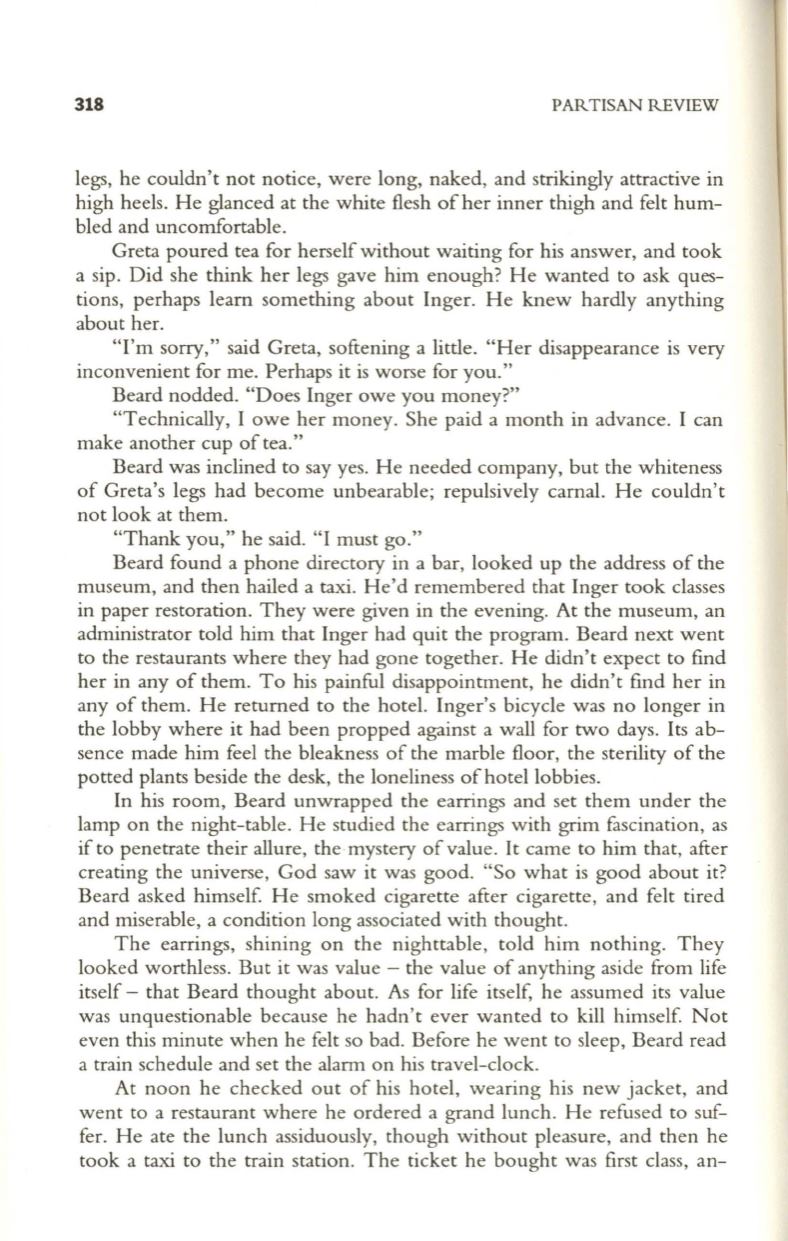
318
PARTISAN REVIEW
legs, he couldn't not notice, were long, naked, and strikingly attractive in
high heels. He glanced at the white flesh of her inner thigh and felt hum–
bled and uncomfortable.
Greta poured tea for herself without waiting for his answer, and took
a sip. Did she think her legs gave him enough? He wanted to ask ques–
tions, perhaps learn something about Inger. He knew hardly anything
about her.
''I'm sorry," said Greta, softening a little. "Her disappearance is very
inconvenient for me. Perhaps it is worse for you."
Beard nodded. "Does Inger owe you money?"
"Technically, I owe her money. She paid a month in advance. I can
make another cup of tea."
Beard was inclined to say yes. He needed company, but the whiteness
of Greta's legs had become unbearable; repulsively carnal. He couldn't
not look at them.
"Thank you," he said. "I must go."
Beard found a phone directory in a bar, looked up the address of the
museum, and then hailed a taxi. He'd remembered that Inger took classes
in paper restoration. They were given in the evening. At the museum, an
administrator told him that Inger had quit the program. Beard next went
to the restaurants where they had gone together. He didn't expect to find
her in any of them. To his painful disappointment, he didn't find her in
any of them. He returned to the hotel. Inger's bicycle was no longer in
the lobby where it had been propped against a wall for two days. Its ab–
sence made him feel the bleakness of the marble floor, the sterility of the
potted plants beside the desk, the loneliness of hotel lobbies.
In
his room, Beard unwrapped the earrings and set them under the
lamp on the night-table. He studied the earrings with grim fascination, as
if to penetrate their allure, the mystery of value. It came to him that, after
creating the universe, God saw it was good. "So what is good about it?
Beard asked himself. He smoked cigarette after cigarette, and felt tired
and miserable, a condition long associated with thought.
The earrings, shining on the nighttable, told him nothing. They
looked worthless. But it was value - the value of anything aside from life
itself - that Beard thought about. As for life itself, he assumed its value
was unquestionable because he hadn't ever wanted to kill himself. Not
even this minute when he felt so bad. Before he went to sleep, Beard read
a train schedule and set the alarm on his travel-clock.
At noon he checked out of his hotel, wearing his new jacket, and
went to a restaurant where he ordered a grand lunch. He refused to suf–
fer. He ate the lunch assiduously, though without pleasure, and then he
took a taxi to the train station. The ticket he bought was first class, an-


